![]()
The Words of the Fleischman Family
|
|
The Words of the Fleischman Family |
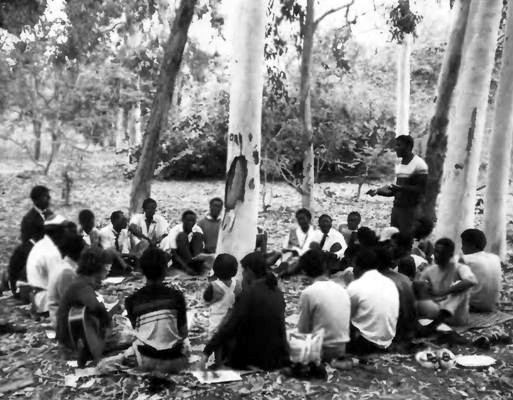
The
holy ground in a park in Dakar during a God's Day celebration.
Patricia Fleischman is one of the original missionaries to Senegal. She dictated this testimony during the recent 120-day leadership training in New York State.
When I was about ten years old, growing up as a schoolgirl in the Midwest, we had to write a story about what we would like to do when we were older. I wrote that I wanted to be a missionary to Africa. I was quite excited about it at the time and went to my Lutheran church to get all the information I could from their brochures about missionary work in Africa.
I forgot all about that idea for years until the time I was pioneering in Wisconsin in 1972. I went with one of my contacts to see a medium, who told me that there was a woman spirit working with me who had been a missionary to Africa. She said the spirit was holding a worn- out Bible.
In February 1975 I was called to the Blessing. For about one year I had been at the headquarters in Washington DC -- working in the kitchen, looking after the house, and taking care of the Salonen's baby. Mr. Salonen asked me if I wanted to be a missionary. I said yes, I had always wanted to be a missionary to Africa.
I was sent to Korea, and on February 8, I was blessed to Justin Fleischman, who was an MFT commander at the time. Right after the Blessing we returned to the United States and about 90 foreign missionaries were chosen. I spoke French, so I was not surprised when the French- speaking West African country of Senegal was chosen as my mission country.
We were supposed to arrive in our mission countries by May 1 to fulfill a providential condition, but there was not enough money to send us all right away. So we had to draw names out of a hat to see who would go first. I was one of the few missionaries whose name was picked. I was 24 years old at the time and I had never been out of the country except for my trip to Korea.
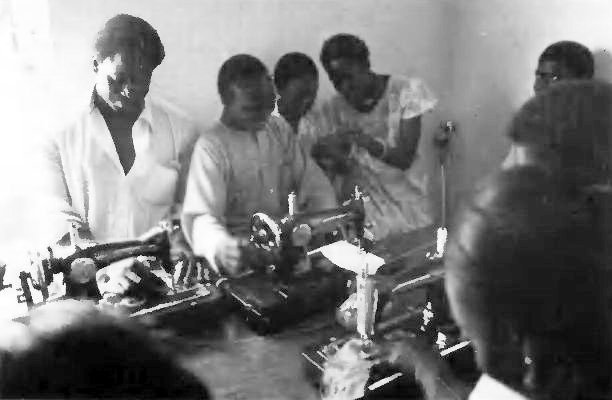
Students
learn the basics of sewing in the Senegal family's program to train
handicapped people.
I arrived in Senegal alone in the middle of the night of May 1, 1975. In order to enter the country a visitor needs to show a return ticket. The last stopover of my flight had been in Germany, so I had had to buy a return ticket to there. That cost me $500. It was half of the money I had been given to begin my mission in Africa.
The German missionary, Bernhard Bode, had arrived about a week before I did, but I had no idea where he was staying. The only thing I could think of was to go to the German embassy in Dakar and try to locate him. I quickly found out that Bernhard was a spiritually open brother. That morning he had gotten the inspiration to go to the German embassy and sit there all morning. When I arrived I found him waiting for me.
Bernhard had reserved a room for me in a very cheap hotel. He was living in another hotel that was even more low-class than mine. I felt terrified. I didn't know anything about the country, but I felt it was a matter of life or death that we stay there. To fulfill our mission we had to stay in the country -- if we didn't, we failed our mission. That was strongly impressed upon us. We were also afraid of getting kicked out of the country. Actually, Senegal is quite free, and we could have declared ourselves as missionaries, but we did not know this at the time.
We started contacting people on the street and had guests coming over right away. The Senegalese like foreigners, and from the very beginning we were teaching the Principle almost every evening.
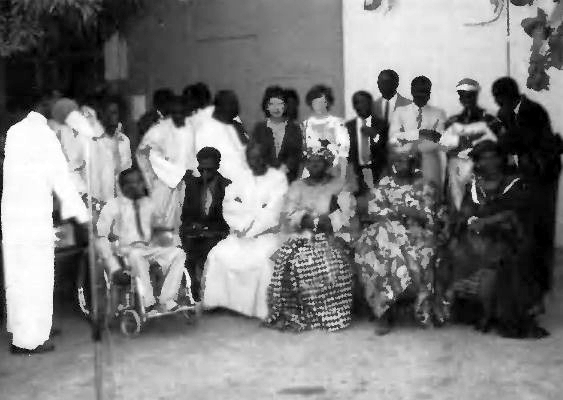
Dignitaries
gather at a ceremony honoring the church for its achievements in
training the handicapped. The three women seated at right are the
ministers of social development, technical instruction, and emigrants
who return to Senegal.
After about two weeks, we got an apartment. It was a two-bedroom place on the top floor of a five-story apartment building and it suited us well. We could see even a little of the city from our window. But we used all of our money for the apartment and we didn't have anything left for furniture. Our sofa was a foam rubber mattress with a little cloth covering it. For the first six months we ate only bread, tomatoes, and mangoes -- we had nothing to cook on.
Our Japanese brother, Makoto Maeda, came a few weeks after we did and even though he could not speak French, he had such a good heart that he had people coming over every day. But we found it was very hard to bring members.
We had unity problems like everybody, but little by little we could work it out. For a long time we had a prayer condition by the ocean, and it helped our unity to pray for the country and the president.
Towards the end of 1975, the police started investigating our church. They had first turned their attention on us for an unrelated matter, but they found out that we didn't know each other before we started living together. They thought this was strange. In 1980, I happened to see their file on us. They thought that we were terrorists. The brothers were kicked out of the country. I found out later that I was supposed to be kicked out too, but for some unknown reason this never happened.
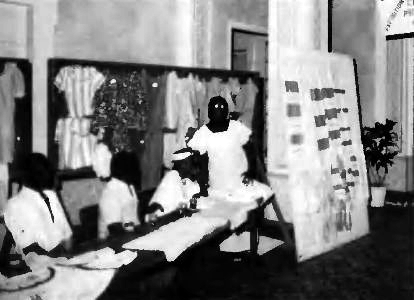
An
exposition in the Dakar City Hall of the clothes made by the
handicapped students.
So my first God's Day in Senegal I was completely alone. I felt an incredibly heavy responsibility on my shoulders, one which I felt incapable of handling. But I was determined to carry on no matter what.
I was actually alone only for a few days. Several missionaries arrived in transit to other countries. Kathy Harting (Rigney) had been kicked out of the communist country of Benin (formerly Dahomey) and stayed with me for about four months. I had gotten a part-time job teaching English, and I continued witnessing with the other missionaries. We had a group of six to eight people who came over every day. But they were Muslims and had a very difficult time understanding and accepting the Principle.
It was very draining to teach every night. Spiritually, everything was very heavy. I would pace back and forth on my balcony every night singing holy songs and praying. That was a very precious time for me, full of deep experiences with God and True Parents.
It was during this time, in 1976, that I was able to get an interview with the president of the country. The man who was then president was Leopold Sedar Senghor, a famous philosopher and poet who had led Senegal to independence. He was president for almost 20 years. He resigned in 1980 -- the first African president to resign and pass the leadership to his successor. He was succeeded by his prime minister, Abdou Diouf, who is the current president.
I was able to have an interview with President Senghor for about 15 minutes, along with one of our home members. I gave him a Divine Principle book and a little book on Father's life. He made no comment other than "Thank you."
These temporary missionaries later left and were replaced by a Japanese brother and a German sister who were assigned as permanent missionaries to the country. This is when we started to really have unity problems. I don't even like to talk about it because we did not bring victory. But towards the end of this time, in August or September 1978, we brought our first member, Solomon Loum, who is now with me in the 120-day workshop in America.
The other two permanent missionaries were then transferred and replaced. In the 10 years I have been in Senegal, there were altogether four different Japanese and four different German missionaries.
We started having guests living in the center in the last few months of 1978, and by the end of the year we had three or four new members. This was the beginning of many, many new struggles to understand and to educate the young members.
Before going to Africa, I had found it really hard to pray and I hadn't had such a deep relationship with God or True Parents. I believe that going there was the beginning of my spiritual life. Having to fight it out alone, with only God to depend on, had been a very deep experience for me. But once we started getting members it was a struggle to expand my heart to the Park for people, who were so openly heartistic themselves. Through struggling to love the members and open the limits of my heart, I could understand God's heart more.
In the last several years, our membership has grown moderately but steadily, and we now have 21 full-time members.
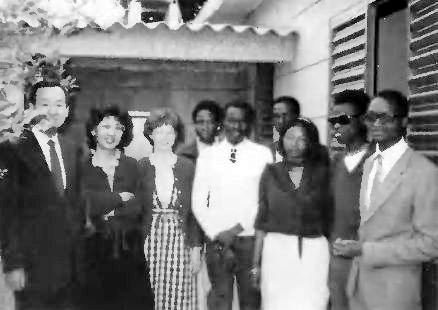
The
ambassador of South Korea (left) and his wife visit Patricia
Fleischman (in checkered dress) and the staff members of the church
in Senegal.
The Senegal family started an educational project for handicapped people in October 1983. We began in one small room with 16 handicapped students. Because most of them supported themselves by begging, we provided them with breakfast and lunch and gave them a small scholarship of a few dollars a month. Our students are mostly young people who are paralyzed in one or both legs. We teach them the basics of tailoring to give them an occupation so that they can be productive members of society. The project is directed by Lassana Djimeia, a native member who is blind and has had some experience teaching handicapped people.
Little by little our project has grown. Last July IRFF began to support us with a grant of $1,000 per month, which has permitted us to expand and take on more students. Now we have rented a house and have 25 students. We hired a master tailor who teaches the advanced group, and also two young girls who teach them the basics of sewing and knitting.
We may eventually have up to 40 students, but a real problem is finding jobs for these handicapped workers after they are trained. So far there has been no result in getting these trained students placed in jobs. In America, people have sympathy for handicapped people, but this is not the case in Senegal. We are now studying this problem and looking int. the possibility of making some kind of factory where we can employ these workers ourselves.
We have received a lot of support from the government through this project, and people have changed their minds about Father through this. Recently, a local businessman donated a used car. During the dedication ceremony, three government officials came to present us with the keys.
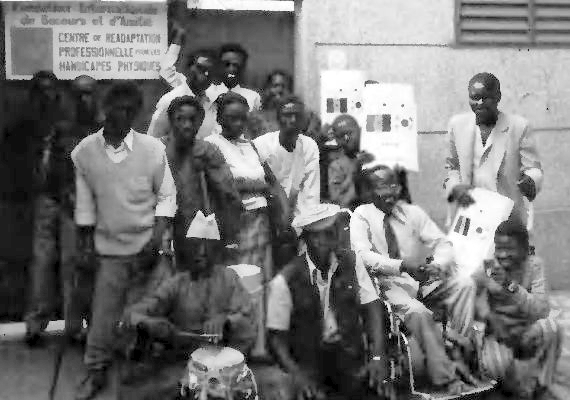
The
handicapped students gather for a group photo. Lassana Djimeia, the
blind brother who heads the project, is at the rear wearing dark
glasses.
We have received a letter from President Diouf saying that his wife, who does a lot of work with handicapped people, will come to visit us soon. We also received much support from the ambassador of South Korea, who has donated several hundred dollars to us and visited us quite frequently.
The Catholic relief fund also gave 60 bales of clothing which we distributed to needy people. They trust us to deliver these goods to the people -- something they cannot do with other agencies.
As we are more established and known, we want to use this educational project to contact important people. We will probably teach Unification Thought at these seminars, since this is predominantly a Muslim country and it is very difficult for the people to understand the Principle.
It has been especially difficult in a Muslim country for a girl to be alone. Now my husband has joined me in Africa and has been there for three years. Before he came, he was working as an MFT commander and had wanted me to join him in America. At first it was difficult for him, but now he loves Africa. Things are so much easier for all of us now.
Senegal is a former French colony -- the first place to be colonized by the French. The level of education is perhaps the highest of any former French colony. When the French came, they extended French citizenship to four cities in Senegal.
The country is very dry and has suffered very much in the last ten years because of drought. The desert has been advancing southward 18 meters per day. In the northern part of the country the people lived by cattle farming, but now the cattle have died and many people survive through support from relatives who have emigrated to France.
About 85 percent of the Senegalese are Muslim, 8 percent are Christian, and the rest are animists (they worship nature, totems, and ancestors). The government is one of the few democratic governments in Africa. There are 15 political parties, most of them Marxist. The ruling party is socialist but is influenced much by Marxist ideology. Senegal is a member of the Socialist International and a member of the Unaligned Nations.